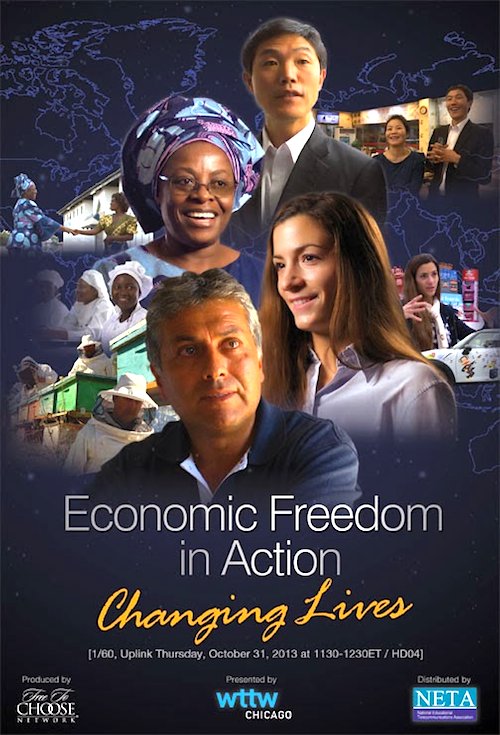By Joe Bendel. Thanks to economic freedom, you can buy Paul Frank merchandise in Slovakia. The availability of monkey-face t-shirts might not sound like an epochal triumph, but it has made a world of difference for the Rybárikovás and their standard of living. Even more dramatic are the case studies of the North Korean defector providing start-up capital to his fellow refugees in the ROK and the Chilean beekeeper exporting queens to struggling European bee farms. Drawing upon these highly personal case-studies and the Fraser Institute’s annual report on world economic freedom, host-economist Johan Norberg argues that policies of economic liberty make the world a better place whenever they are adopted in Economic Freedom in Action: Changing Lives, which airs on Chicago’s WTTW this Thursday.
Written and directed by James & Maureen Castle Tusty, the filmmakers responsible for inspiring Singing Revolution, and produced in conjunction with the Free to Choose Network, Action follows the template established by Milton & Rose Friedman’s groundbreaking series, sprinkling manageable nuggets of analysis amid plentiful real world examples. Spanning the globe, Action starts in Africa, examining the country’s extraordinary turn-around from the perspective of Sylvia Banda.
Under Socialist president-for-life Kenneth Kaunda, Zambia was an economic basket case – but following his ouster, it has become one of the continent’s fastest growing economies, thanks to an ambitious privatization program. Banda was able to ride that wave. Starting with an unfurnished one-room restaurant, she now operates one of the nation’s largest food supply companies. Through capitalism, she has enacted a series of agricultural and hygiene reforms that the government and NGOs struggled to implement.
The contrast between economic liberty and authoritarianism is starkly demarcated on the Korean peninsula. While famine is an everyday fact of life in the tightly regimented DPRK, the ROK is a land of plenty, often leading to culture shock for defectors like Daesung Kim. To help his fellow refugees adapt, Kim started a venture capital firm that invests in their small enterprises. Once struggling to survive, those he works with now have a stake in South Korea’s economy and can provide entrepreneurial expertise if and when the North finally liberalizes its markets and political system.
 Arguably, Kim is the bravest capitalist featured in Action. In contrast, the stakes were never so high for Katerina Rybáriková, but her story nicely illustrates the necessity of economic liberty in addition to political liberty. After the fall of communism, Slovakia still lagged behind most of Eastern Europe and ranked relatively low on the Fraser Institute’s index. However, a concerted program of privatization and property rights guarantees created the climate that allowed Rybáriková to successful pitch a Slovakian franchise to the Paul Frank corporate office.
Arguably, Kim is the bravest capitalist featured in Action. In contrast, the stakes were never so high for Katerina Rybáriková, but her story nicely illustrates the necessity of economic liberty in addition to political liberty. After the fall of communism, Slovakia still lagged behind most of Eastern Europe and ranked relatively low on the Fraser Institute’s index. However, a concerted program of privatization and property rights guarantees created the climate that allowed Rybáriková to successful pitch a Slovakian franchise to the Paul Frank corporate office.
One might expect Action to steer clear of Chile, yet it completely proves the thesis of Friedman’s Capitalism and Freedom, with political liberty duly following the establishment of economic liberty. While acknowledging the abuses of the Pinochet regime, Action charts the explosive growth following his economic reforms that remain largely unadulterated to this day. Thanks to the market-based economy, brothers John and Miguel Hernandez have been able to build their bee farm into a going pollination service and bee queen exporting concern, a business with particularly positive global ramifications, given environmental concerns regarding dwindling bee populations.
Chile and South Korean have consistently ranked high on the Fraser report, while Zambia and Slovakia have been recent up-and-comers. That begs the obvious question: how does America rank? For years, we usually held the second or third spot, but we have fallen in recent years, to number nineteen. Norberg and the Tustys do not engage in a lot of finger-wagging, but the significance of this tumble is hard to miss.
Indeed, Action is a remarkably sure-footed exploration of the real world impact of economic policies. By focusing on human stories it never comes across like an econ lecture or a ration of polemics. It is thoroughly convincing, but it is also really good television, taking viewers to places they rarely see in the mainstream media. Highly recommended, Economic Freedom in Action: Changing Lives airs this Thursday (11/14) on Chicago’s WTTW and can be seen in syndication on PBS stations throughout the month. It will also be available for online viewing courtesy of the Free to Choose Network.
LFM GRADE: B+
Posted on November 11th, 2013 at 2:20pm.